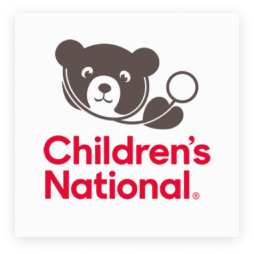Children's National Hospital Catherine Bollard selected to lead global Cancer Grand Challenges team taking on solid tumors in children
Catherine Bollard's team, co-led from University College London, UK, will receive $25m to take on the Solid Tumors in Children Challenge, seeking to develop novel immunotherapy treatments for children with solid cancers
A world-class team of researchers co-led by Catherine Bollard, M.D., M.B.Ch.B., director of the Center for Cancer and Immunology Research at Children’s National Hospital, has been selected to receive a $25m Cancer Grand Challenges award to tackle solid tumors in children. Cancer Grand Challenges is a global funding platform, co-founded by Cancer Research UK and the National Cancer Institute in the U.S., that supports a community of diverse, global teams to come together, think differently and take on some of cancer’s toughest challenges.
The Cancer Grand Challenges NexTGen team, co-led by University College London’s Martin Pule, M.D., will be working to develop next-generation cell therapies for children with solid cancers. Cancer is a leading cause of death by disease in children worldwide. Although survival has increased for some pediatric cancers, such as blood cancers, survival for some solid tumors has seen little improvement for more than 30 years. The team hopes to build a much deeper understanding of childhood cancers and develop and optimize novel therapies for children with solid tumors, ultimately hoping to improve survival and diminish the lifelong toxicities often experienced by survivors.
“With our Cancer Grand Challenge, we hope to bring next-generation CAR T-cell therapies to children with solid tumors,” said Dr. Bollard. “What excites me most is the energized, passionate group of people we’ve brought together to take this challenge on. Big problems remain to be addressed, but we believe they can be solved, and that we’re the team to solve them."
“NexTGen represents crucial and overdue work. It has hope written all over,” said Sara Wakeling, patient advocate on the team and CEO and co-founder of Alice’s Arc, a children’s charity for rhabdomyosarcoma. “NexTGen hopes to transform the way these aggressive solid tumors are treated with less toxic side-effects, giving the children a real chance at growing up and realizing their potential. I’m so proud to be part of this exceptional team of scientists, clinicians and advocates who want to change the story for those diagnosed.”
The NexTGen team unites scientists and clinicians with expertise in immunology, proteomics, mathematics and more, across eight institutions throughout the U.S., U.K. and France. The Children’s National investigators that will also join are:
- Nitin Agrawal, Ph.D., associate professor in the Center for Cancer and Immunology Research at Children’s National
- Conrad Russell Cruz, M.D., Ph.D., principal investigator for the Program for Cell Enhancement and Technologies for Immunotherapies at Children’s National
- Patrick Hanley, Ph.D., chief and director of the Cellular Therapy Program at Children’s National and leader of the Good Manufacturing Practices laboratory
- Amy Hont, M.D., oncologist in the Center for Cancer and Immunology Research at Children’s National
- AeRang Kim, M.D., oncologist in the Center for Cancer and Blood Disorders at Children's National
- Holly Meany, M.D., oncologist in the Center for Cancer and Blood Disorders at Children's National
- Anqing Zhang, biostatistician in the Biostatistics and Study Methodology Department at Children's National
The team, co-funded by Cancer Research UK, the National Cancer Institute and The Mark Foundation for Cancer Research, aims to bring much needed new treatments to children with solid cancers.
The NexTGen team is one of four new teams announced today as part of Cancer Grand Challenges, representing a total investment of $100m to diverse, global teams to take on some of the toughest challenges in cancer research.
“Cancer is a global issue that needs to be met with global collaboration. This investment in team science encourages diverse thinking to problems that have long hindered research progress,” said David Scott, Ph.D., director of Cancer Grand Challenges, Cancer Research UK. “Cancer Grand Challenges provides the multidisciplinary teams the time, space and funding to foster innovation and a transformative approach. NexTGen is one of four newly funded teams joining a scientific community addressing unmet clinical needs across cancer research.”
About Cancer Grand Challenges
Cancer Grand Challenges supports a global community of diverse, world-class research teams with awards of £20m/$25m to come together, think differently and take on cancer’s toughest challenges. These are the obstacles that continue to impede progress and no one scientist, institution or country will be able to solve them alone. Cancer Grand Challenges teams are empowered to rise above the traditional boundaries of geography and discipline.
Founded by the two largest funders of cancer research in the world – Cancer Research UK and the National Cancer Institute* in the U.S. – Cancer Grand Challenges aims to make the progress against cancer we urgently need. Cancer Grand Challenges currently supports more than 700 researchers and advocates across 10 countries, representing 11 teams are supported to take on 10 of the toughest challenges in cancer research.
The Cancer Grand Challenges NexTGen team, announced June 16, 2022, is taking on the initiative’s Solid Tumours in Children challenge. It is led by Dr. Bollard (Children’s National) and Dr. Pule (University College London), along with 23 co-investigators and 7 patient advocates, and is spread across eight institutions across the U.S., U.K. and France: Cardiff University; Children’s Hospital of Philadelphia; Children’s National Hospital; INSERM; the Institute of Cancer Research; Stanford Medicine; Stanford University; University College London. The Cancer Grand Challenges NexTGen team is funded by Cancer Research UK, the National Cancer Institute in the U.S. and The Mark Foundation for Cancer Research.
*The National Cancer Institute is part of the National Institutes of Health.




